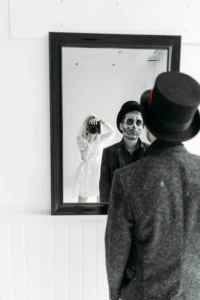
Debbie Harry, the energetic lead singer of Blondie, has been a pioneer in music, fashion, and pop culture for many years. She was born in Miami, Florida, but grew up in New Jersey. Her path to fame is as diverse as her music style. Starting off as a Playboy Bunny and transforming into a punk rock legend, she has always found ways to change and evolve, making a lasting impact on the entertainment industry. Let’s explore the life and legacy of this amazing artist, whose influence still motivates many people today.
Early Life: A Unique Beginning
Debbie Harry, originally named Angela Trimble, was born on July 1, 1945, in Miami. She was adopted as a baby by Catherine and Richard Harry, who changed her name to Deborah Ann Harry. Growing up in Hawthorne, New Jersey, her childhood was a blend of typical suburban life and creative adventures. Even back then, her rebellious nature and curiosity about the world were clear, traits that would later shape her career.
Before becoming famous, Harry tried out different jobs, like being a secretary and even working as a Playboy Bunny. These experiences gave her a special view on life, helping her develop her art and strength as she made her way through the male-dominated music scene.
The Formation of Blondie: A Punk Revolution
In 1974, Harry teamed up with guitarist Chris Stein, who was also her boyfriend and creative partner, to start the band Blondie. They came out of the lively punk scene in New York, mixing different styles like punk, disco, reggae, and pop to create a unique sound. Their first album, called “Blondie,” was released in 1976 and showcased Harry’s unique voice and stylish punk look to everyone.
The big moment for Blondie happened with their album Parallel Lines in 1978. This album featured popular songs like “Heart of Glass” and “One Way or Another.” These hits shot Blondie to worldwide fame, and “Heart of Glass” became a major anthem of the disco time. Debbie Harry’s amazing stage presence and bold fashion made her a style icon, inspiring many artists and fans.
Crossover Success: Music Meets Acting
As Blondie became more popular, Harry decided to try acting, showing that she could do more than just music. She starred in movies like Union City (1980) and David Cronenberg’s Videodrome (1983), proving she was a talented artist in different areas. Her roles in films reflected the same boldness she had in her music, often taking on characters that pushed against what society expected.
During the 1980s, while Blondie was on a break, Harry’s solo career took off. Her first solo album, KooKoo (1981), included work with Nile Rodgers and Bernard Edwards from Chic, mixing her punk style with cool, modern sounds. Even though her solo music didn’t reach the same level of fame as Blondie, it showed that she was open to trying new things and growing as an artist.

Blondie’s Reunion and Continued Impact
Blondie got back together in the late 1990s, and their fans were super excited. They made a big comeback with the album No Exit in 1999, which included the hit song “Maria.” This reunion showed that Blondie was still a big deal in music, and their style was still popular.
After that, Debbie Harry and the band kept making music, releasing albums like The Curse of Blondie in 2003 and Pollinator in 2017. The last one had some cool collaborations with newer artists, showing how Blondie’s music still connects with today’s sounds.
Debbie Harry’s Enduring Fashion Legacy
Harry has made a big impact not just in music but also in fashion. With her shiny platinum blonde hair, bold outfits, and confident vibe, she sets trends and breaks the rules. Whether she’s wearing something from a thrift store or a fancy designer piece, Harry’s style is unforgettable, mixing the do-it-yourself spirit of punk with the glitz of high fashion.

Her fascination with Marilyn Monroe inspired much of her look, but Harry added her own edge. Whether donning thigh-high boots, asymmetrical dresses, or graphic tees, she pushed boundaries and encouraged individuality. Designers like Vivienne Westwood and Stephen Sprouse found a muse in Harry, further intertwining her legacy with fashion.
Facing Challenges with Strength and Resilience
Harry had to deal with a lot of tough times, even though she seemed glamorous. In the early days, Blondie had some big hits, but they also faced serious money problems that put the band in a tough spot by the mid-1980s. Harry even took a break from her music career to help her bandmate Chris Stein while he was fighting a rare disease called pemphigus vulgaris.
Even with these challenges, Harry didn’t give up. She turned her tough experiences into inspiration for her art. In her 2019 memoir, Face It, she shares her life story honestly, talking about everything from addiction and relationships to the difficulties of getting older in the public eye. Throughout her journey, Harry’s humor and strength shine brightly, encouraging readers with her real and honest approach to life.

A Cultural Icon at 79: Still Breaking Barriers
At 79, Debbie Harry is still a major influence in the music and fashion worlds. Her latest partnership with Gucci for the Cruise 2025 campaign shows that she’s still a big deal in style. The photos, taken by the famous Nan Goldin, showcase Harry’s classic charm and bold personality.
As a headliner at music festivals and a bestselling author, Harry’s appeal is still strong. Whether she’s performing at Glastonbury or looking back on her amazing career, she shows gratitude and curiosity. “How did I get so old? I guess I’ve been lucky,” she jokes, accepting aging with elegance.
The Legacy of Debbie Harry
Debbie Harry has made a huge mark on music, fashion, and culture. As the lead of Blondie, she brought punk music into the spotlight, breaking down barriers and changing what it means to be a rock star. Her bold attitude towards art and life has motivated many artists, including Madonna and Miley Cyrus.
More than just a musician, Harry represents strength, creativity, and uniqueness. She has faced the ups and downs of fame with determination, showing that real artistry has no age limits. Whether she’s performing on stage or appearing in a Gucci ad, Debbie Harry continues to inspire and amaze.
Conclusion: A Legend for the Ages
Debbie Harry’s story shows how powerful it is to reinvent oneself and stay true to who you are. From her beginnings in New Jersey to becoming a worldwide icon, she has always been authentic, facing every challenge with bravery and creativity. As she keeps breaking new ground and inspiring younger generations, one thing is clear: Debbie Harry’s legacy will last, shining brightly for years to come.





